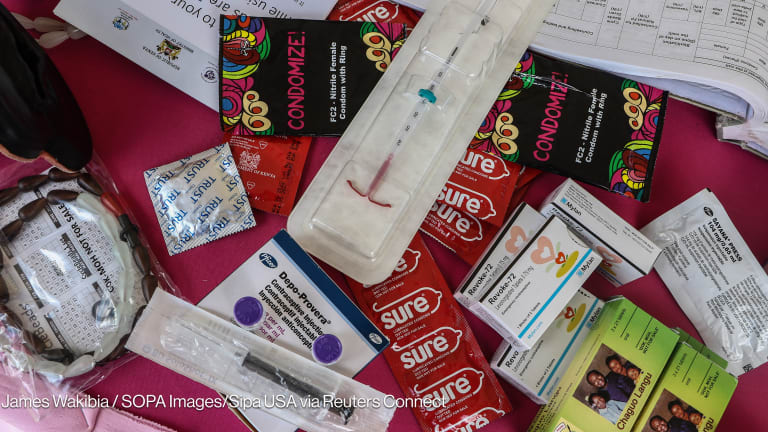
KIGALI, Rwanda — The mood was somewhat optimistic, and certainly enthusiastic, buoyed in large part by the energy of more than 600 youth leaders who were invited to participate in the International Conference on Family Planning in Kigali, Rwanda this week. A packed agenda saw more than 3,500 advocates gather for storytelling and music, alongside the more traditional conference events.
However, the dark clouds of conservatism seeking to curtail sexual and reproductive rights — in the United States, parts of Europe, and most recently in Tanzania — were never far from sight, though not often addressed by the official program.
“Much of the global push has been to fill unmet needs by having more methods [of contraception] and more clinics, but we need to overcome cultural and informational barriers.”
— William Ryerson, president, the Population Media CenterConference-goers were also faced with the reality that the targets set by the Family Planning 2020 partnership — of reaching 120 million more women with contraception in the world’s poorest countries by 2020 — will not be met.
Today, more than 300 million women have access to modern family planning, but an estimated 214 million do not, and 25 million unsafe abortions take place every year.
ICFP, now in its fifth year, appeared to show broad consensus around the need for fresh thinking. But some participants expressed concern that not enough was being done to address the growing threat of populism. Some advocates said they were surprised not to see more sessions on the United States’ Mexico City Policy on abortion-related work, for example.
Devex was on the ground in Kigali to round up the key talking points.
1. Making the investment case
Convincing governments that family planning is a good return on investment was a major theme. The Copenhagen Consensus Center estimates that every $1 spent on family planning yields up to $120 in benefits over a 50-year period by slowing population growth, which in turn improves health and education outcomes and facilitates economic growth.
Progress on family planning way off target, FP2020 update reveals
The Family Planning 2020 partnership has admitted it cannot meet its goals in an update at the International Conference on Family Planning in Rwanda.
The Philippines has embraced this argument and made family planning and other human capital investments a government priority, Ernesto Pernia, secretary of socioeconomic planning, said Tuesday.
“When people are able to care for their reproductive health and plan [their] families they can save more and invest in their children better … [which] results in economic growth … higher incomes and improved living standards … This can be a virtuous cycle … not only a lifetime of returns but intergenerational returns,’ he told reporters.
Parliamentarians from 20 FP2020 focus countries also committed to ensuring universal access to family planning during the conference. This includes Burkina Faso, which increased its modern contraceptive prevalence by a more than 5 percent rate between January 2017 and 2018.
“Burkina Faso is on track to self-reliance and domestic resource mobilization. We are in the process of declaring family planning free at all levels,” said Nicolas Meda, the country's minister of health, during the closing ceremony on Thursday.
For the first time, FP2020 has started tracking some domestic government spending on family planning — its progress report contained budget data from 31 countries.
But Katja Iversen, head of Women Deliver, told Devex it is important not to lose sight of the human rights argument for family planning.
“The rights argument is not going to change the current on its own, and economic arguments alone are disregarding the rights of the individual human … They need to go hand in hand,” she said.
2. Donor financing
Unsurprisingly, how to secure more donor financing — which remained fairly stagnant at $1.27 billion last year, according to FP2020 — was also a key topic.
Arthur Erken, director of communications and strategic partnerships at the United Nations Population Fund, told Devex that UNFPA Supplies, which is the biggest provider of contraceptives to low-income countries, is facing a $350 million funding shortfall over the next two years if donors do not step up.
Some funding announcements were made during ICFP, including a pledge from Canada for over $79 million in new funds for family planning organizations, and £200 million ($255.65 million) from the United Kingdom to scale up its flagship “Women’s Integrated Sexual Health” program. But the time of relying on grant money for family planning is over, Erken said, and more thinking needs to go into innovative financing models and investors.
During the conference, the Bill & Melinda Gates Foundation announced an $18 million commodity matching fund which will proffer $2 for every $1 that domestic governments from francophone West African countries in the Ouagadougou Partnership, which aims to increase family planning users in its nine member countries by 2020, allocate to family planning.
However, some were not happy with the focus on commodities and said more needs to be spent on building demand.
“Much of the global push has been to fill unmet needs by having more methods [of contraception] and more clinics, but we need to overcome cultural and informational barriers,” said William Ryerson, head of the Population Media Center, which creates radio soap operas designed to deliver social, environmental, and health messages.
3. Integration
The need to integrate family planning with other services was high on the agenda. World Vision and the Pfizer Foundation spoke to Devex about a project to combine child immunization services with family planning in Kenya. Preliminary findings show that co-locating the services in clinics has led to “significant growth” in the uptake of both, according to Miriam Mbembe, director of health and nutrition at World Vision Kenya. The Foundation is funding similar projects in Benin, Ethiopia, Uganda, and Malawi.
How family planning can help save cheetahs
Conservationists and reproductive health actors may seem unlikely partners, yet two organizations have teamed up to publish a policy paper advocating for joint work on cheetah conservation and family planning.
Advocates of “population, health, and environment” approaches, or PHE, which combine family planning provision with environmental conservation, said they were pleased to see more PHE sessions at ICFP than in previous years. Cheryl Margoluis, senior technical adviser on PHE at Pathfinder International, said this is down to the drive for integration within the Sustainable Development Goals.
However, some health and conservation actors, not used to working together, still need to be brought on board, Margoluis said, and events such as ICFP are valuable opportunities for sectors to “come together and realize our shared objectives and find a common ground and common language.”
4. New products and services
The conference also brought exciting news about new contraceptive products and services. On Thursday, CEOs from 10 leading family planning organizations pitched “game-changing” ideas to the audience. Population Council’s Julia Bunting was the runaway winner after announcing a new contraceptive gel for men which has moved to phase two clinical trials.
Population Council also announced that Annovera — its new hormonal contraceptive ring for women — has been approved by the U.S. Food and Drug Administration. The device is well suited for use in low-income countries because it lasts for a year and does not require cold storage or regular visits to a clinic.
Safeguarding adolescents when using HCD in family planning
Human-centered design can transform family planning for adolescents and young people, but safeguards are needed. A group of organizations has agreed to adhere to 20 principles.
Human-centered design was also highlighted as a promising way of improving family planning uptake among adolescent girls. Population Services International said it has been successfully applying the approach in its flagship “Adolescents360” program. As HCD can pose unique risks, PSI and others launched a “commitment to action” during the conference, which includes 20 best practice principles to safeguard HCD participants.
5. New faces
The power of sociocultural norms to influence whether women use family planning or not came up time and again. A number of sessions focused on the need to include religious leaders, who are often “willing to talk about family planning when they have the facts,” according to Mona Bormet, program director at Christian Connections for International Health.
“If we want to truly serve our communities and to do so in a culturally competent manner, we need to embrace learning about what the people we are serving believe and care about and how that affects their health care choices and decisions,” she said.
The need to engage men and boys was also raised in a number of side events focused on male contraceptive methods, especially vasectomies. “Agencies like USAID [U.S. Agency for International Development] and others … have realized that the full engagement of men and women will yield far greater results and will help us accelerate progress,” said Pape Amadou Gaye, CEO of IntraHealth.








